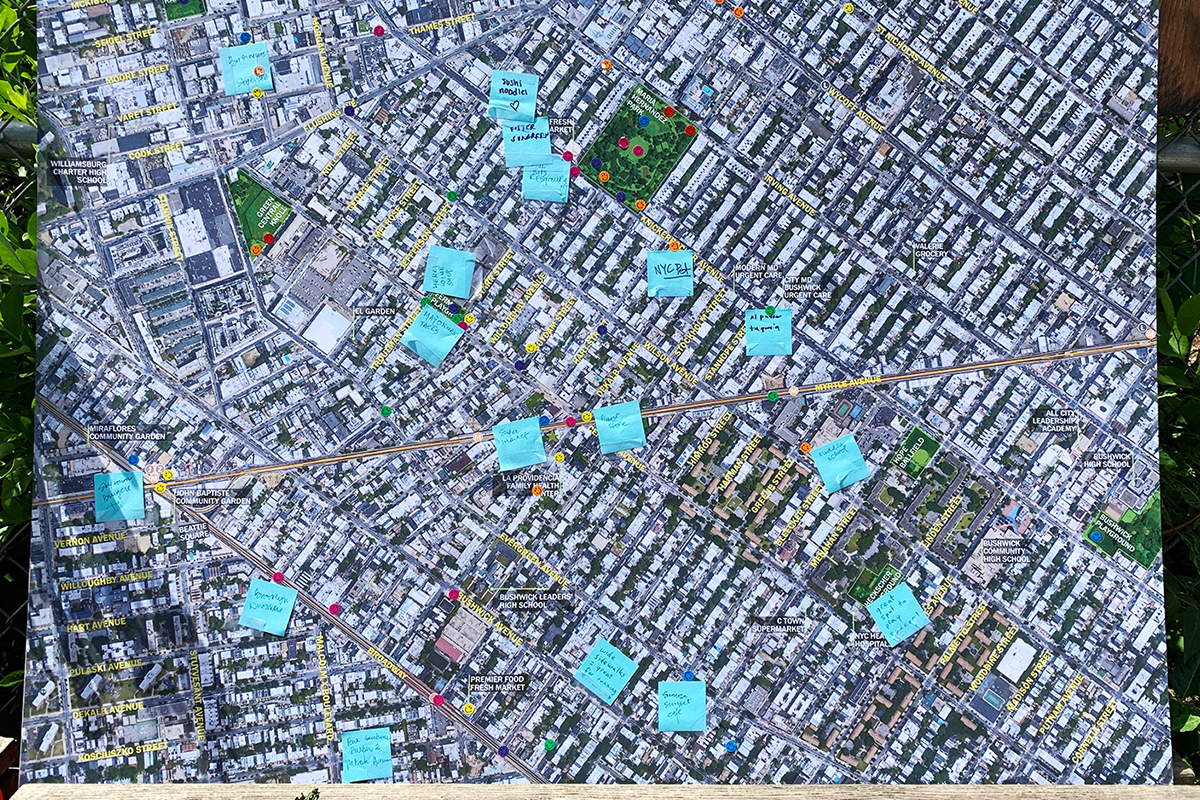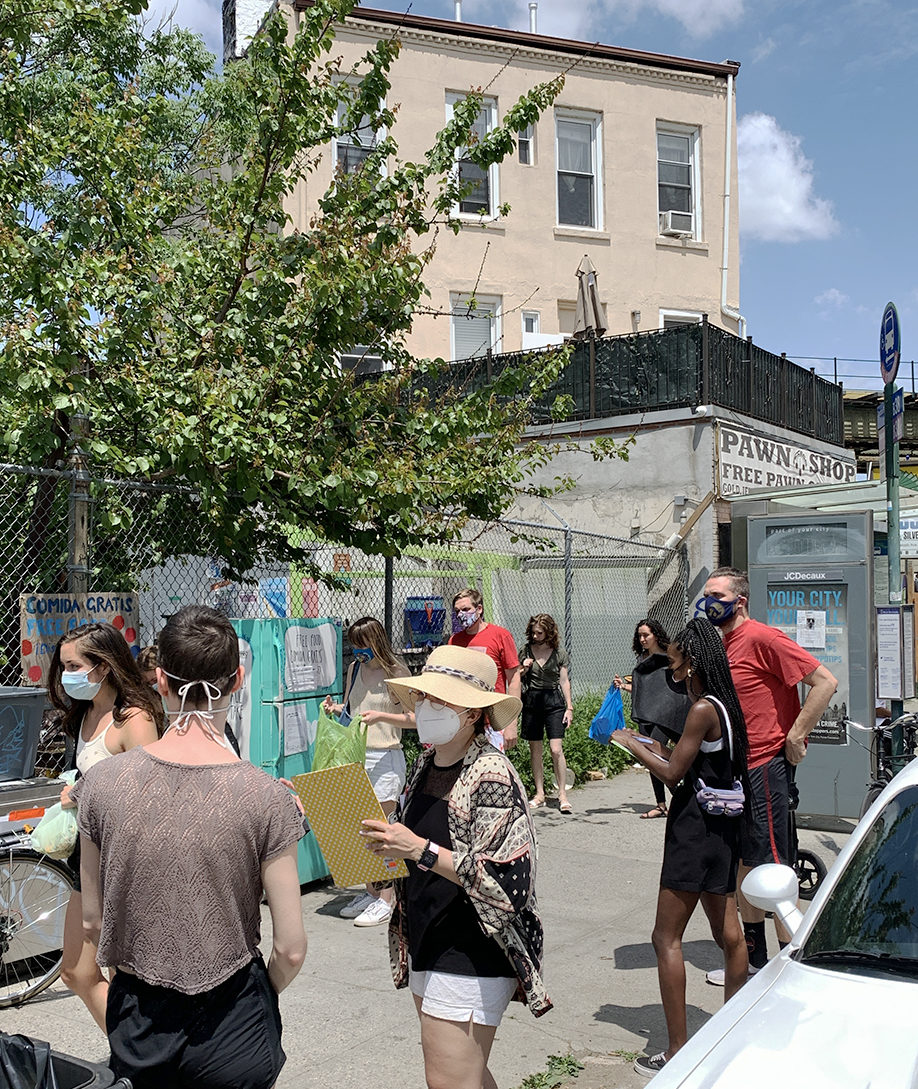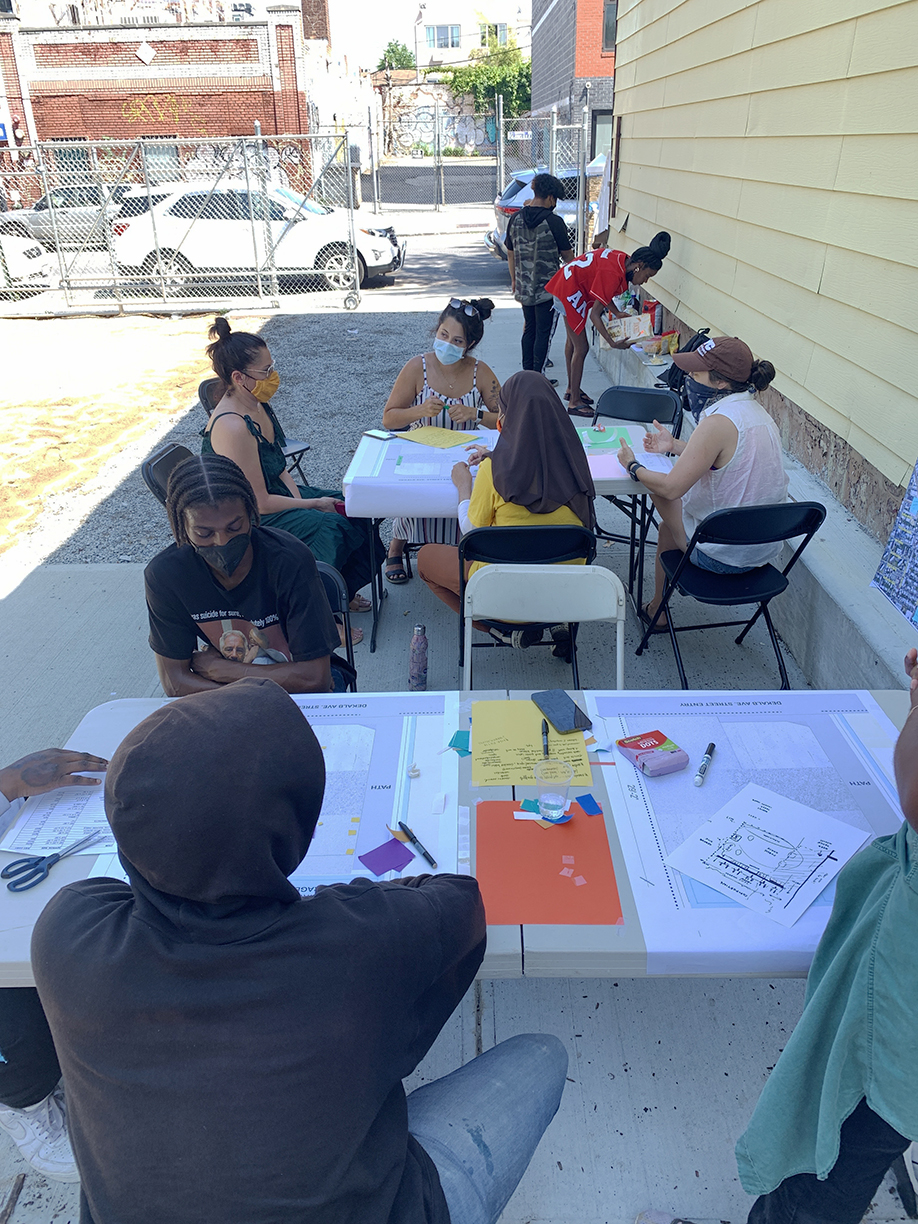
The Urban Design Forum’s 2020 Forefront Fellowship, Cooperative Works, explored how to support minority-owned businesses and workers of color, expand worker cooperatives, and democratize economic resources to build a more inclusive economy. In partnership with the Deputy Mayor for Strategic Policy Initiatives and the Mayor’s Office of M/WBE, Fellows investigated how to create economic opportunity for MWBEs and employee-owned businesses through climate investment, leveraging Local Law 97.
This spring, Fellows developed original projects that explore how to build local power through composting, develop innovative financing for green cooperatives, and scale green entrepreneurship. Explore all proposals here.
by Jhordan Channer, Andrew Harris, William Hsu, Sheila Lin, Stefanie Loomis, Priya Mulgaonkar, Shachi Pandey, Alexandra Paty-Diaz, Ebony Wiggins
Our project Rooted Resiliency explores ways to build community power through connected hyper-local networks. It anticipates a post-capitalist vision of a shared, participatory economy that embraces the idea of abundance to form harmonious relationships. This stands in contrast to the emphasis on scarcity, competition, and unequal exchange that is typical to our understanding of economics today.
 Every recent crisis — COVID-19, Sandy, the Great Recession — has glaringly exposed the inequities in our society and the inadequacies of our systems to address them. The stark differences in the distribution of resources and services translate directly into the challenges neighborhoods and local communities face when addressing the green transition and climate change.
Every recent crisis — COVID-19, Sandy, the Great Recession — has glaringly exposed the inequities in our society and the inadequacies of our systems to address them. The stark differences in the distribution of resources and services translate directly into the challenges neighborhoods and local communities face when addressing the green transition and climate change.
Many have touted the implementation of walkable “15-minute neighborhood” concepts as a possible solution for providing equitable access to basic needs. However, our conversations with on-the-ground organizers revealed deep systemic issues. These include an over-reliance on centralized supply of services and production of goods as well as top-down funding priorities and policies that are out of sync with ground realities. Take for instance the staggering number of small businesses – 97,966 to be precise – that permanently shut down in 2020, despite resources meant to directly support them.
Over the last few months we partnered with BK ROT to explore the challenges, benefits, and needs to strengthen bottom-up initiatives and move us closer to a vision of resilient local power.
BK ROT is a community-supported, fossil fuel free, food waste hauling and composting service. Through their operations, they are advancing values of environmental justice and creating space for youth leadership in communities of color, while creating a localized green economy. Last year, when the Department of Sanitation (DSNY) halted its curbside composting and food waste collection program, organizations like BK ROT stepped up to fill the gap. Not only did BK ROT continue to provide uninterrupted local services to existing users, they also accommodated a much wider community of users whose services were discontinued by our centralized waste management system.
 We engaged directly with workers, users, neighbors, board members, and executive staff of BK ROT through a series of design and mapping workshops, as well as in-depth one-on-one conversations. At the heart of our engagements is the idea that strengthening local community and infrastructure networks can greatly empower bottom-up initiatives to succeed and give them staying power in the long run. Additionally, we recognize that with their deep roots in the surrounding communities, these organizations are keenly aware of and care about local needs. They offer holistic solutions for communities to evolve as one, versus embracing a tunnel-vision approach of providing services to extract profit.
We engaged directly with workers, users, neighbors, board members, and executive staff of BK ROT through a series of design and mapping workshops, as well as in-depth one-on-one conversations. At the heart of our engagements is the idea that strengthening local community and infrastructure networks can greatly empower bottom-up initiatives to succeed and give them staying power in the long run. Additionally, we recognize that with their deep roots in the surrounding communities, these organizations are keenly aware of and care about local needs. They offer holistic solutions for communities to evolve as one, versus embracing a tunnel-vision approach of providing services to extract profit.
With this in mind, we co-created programmatic and site design propositions specific to BK ROT that aimed at strengthening their networks of users and collaborators. We also explored models of co-operative ownership and governance to empower their youth leaders and staff to drive impact for the organization. We believe our approach can help organizations like BK ROT become more resilient and act as roots for their communities to thrive.
 Residents, leaders, community organizations, local agencies, and governments all have a role to play in this transformation towards a post-capitalist vision of a shared, participatory economy. It is imperative that our government agencies engage with the community at large to facilitate an understanding of local needs. More importantly, local governments need to provide clear and innovative avenues for participatory resource and budget planning in response to those needs.
Residents, leaders, community organizations, local agencies, and governments all have a role to play in this transformation towards a post-capitalist vision of a shared, participatory economy. It is imperative that our government agencies engage with the community at large to facilitate an understanding of local needs. More importantly, local governments need to provide clear and innovative avenues for participatory resource and budget planning in response to those needs.
As members of the community, we need to be aware of our choices and how they support or negatively impact critical local initiatives. For BK ROT, this means listening to their needs and challenges, supporting their site development, expanding their network of composting sites, and their integration into the surrounding neighborhoods through community events. The development and strengthening of a potential cornerstone like BK ROT is, and will be, how we root in resiliency and community power.
Download the Report ►